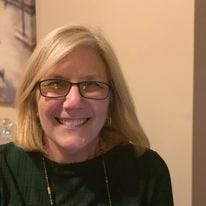Look up to the stars
Bobbe sees the world beyond the stars as clearly as the one most of us see here on Earth
Smart, caring, attractive, and fun-loving. These are not typical descriptions that come to mind when most people think of a staff psychiatrist, especially in a chemical dependency/mental health facility. Bobbe defied most of the stereotypes found in movies and TV shows and did not let others’ expectations define her.
Bobbe and I worked together at Henry Ford Health System’s highly regarded residential chemical dependency treatment center, Maplegrove Center, where I was the department director, and she was the staff psychiatrist. In our daily case conferences, while discussing patients and their treatment needs, experienced staff members knew how to give Dr. Bobbe what she needed. But new staff, already nervous about presenting their first case to a room full of doctors, nurses, and therapists, would start the way they had been taught, “This patient is a 36-year-old single Black woman from Detroit who works…”
“Excuse me,” Bobbe would interrupt, often before they got this much out. “What’s their birthdate?” she would ask.
“Oh shoot. Was I mumbling?” they’d think to themselves. They’d sit up in their chair, clear their throat, and start again. “This patient is a 36-year-old single Black woman,” they’d reply, trying to exude both confidence and competence. At this point, others in the room might try to hide their smirks, which often served to make the poor newbie even more uncomfortable.
Bobbe didn’t care all that much about how old a patient was, although that certainly had implications for their treatment needs. No, she needed their birthdate. That was the only way she could create the patient’s astrological chart while listening to the case presentation. As the therapist fumbled through the patient’s chart to find the actual birthdate, Bobbe would pull out her pencils and a fresh sheet of paper, laying them before her as if willing an image to magically appear on the page.
When new staff members raised their eyebrows at her emerging drawing of mysterious connecting circles and lines, she never appeared embarrassed by being caught. “It helps me understand the patient more fully,” she would say as she turned her attention back to the case presentation, expecting them to do the same.
This might sound bizarre to the uninitiated, but astrology was one of many ways that Bobbe saw each patient through a wider, and more universal lens than her medical training offered her. Bobbe grew up in an ultra-strict fundamentalist household and, as a result, didn’t see her first movie until she was in college. That experience changed her life. Astrology was the way she interpreted her world, and movies made her world bigger, opening her up to fantasy, science fiction, and all kinds of relationships. Bobbie devoured the big screen, sometimes seeing multiple movies in one day and when VCRs and then DVDs came out, she caught up with all the old movies she’d missed as a child. For her, it was all about expanding her universe in every way possible.
Because of her openness to seeing each patient from various perspectives, she touched patients in new ways—always open to considering how a patient’s history, especially their birth story, might affect their treatment—and challenged other clinical staff to do the same.
By just being herself, by interpreting the world in ways that made sense for her, Bobbe modeled for me how to defy stereotypes, to do the unexpected, and, no matter what, to follow my instincts. She has lived her life that way and, in doing so, has connected those around her to the importance of looking beyond the mundane up to the stars.
If you’re enjoying these stories, please Share Accidental Mentors. Every new reader means a lot to me.
Next post:




